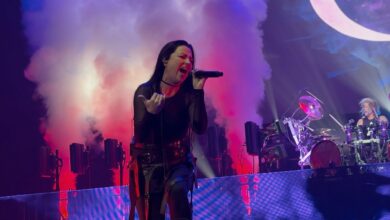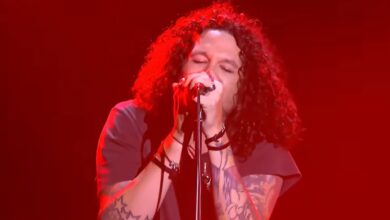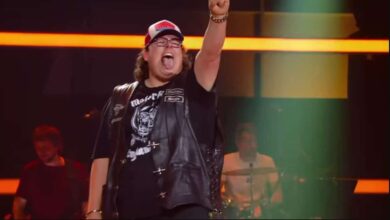Zakk Wylde Electrifies Lumen Field with a Blistering Guitar Rendition of the National Anthem Before Seahawks vs. Rams Week 9 Showdown
Even before a single point went on the board in Seattle’s Week 9 clash with the Los Angeles Rams, it already felt like the home team had scored. The November air over Lumen Field was crisp and electric, that particular mix of drizzle, cold and neon that only the Pacific Northwest seems to do. As fans in navy, action green and highlighter beanies filtered into their seats, the usual pregame soundtrack of classic rock and hype videos suddenly dipped. Rumors had been buzzing all morning that a special guest was handling the national anthem, but the stadium kept it coy right up until the moment the big screens lit up with a familiar bearded silhouette and a bullseye-patterned guitar.
When the announcer’s voice boomed that the anthem would be performed by “Black Label Society frontman and longtime Ozzy Osbourne guitarist, Zakk Wylde,” the roar that came back felt more like a festival crowd than an NFL audience. The camera cut to the 50-yard line, where Wylde stood in a custom blue-and-green Seahawks jersey, his trademark mane of blond hair spilling over the shoulders, a signature Les Paul hanging low over a field-level sea of helmets and pads. Beside him, a line of Marshall stacks rose like a black stone wall, the clearest signal possible that this was not going to be a polite, traditional rendition.
There’s something poetically fitting about a guitar hero playing “The Star-Spangled Banner” in Seattle, hometown of Jimi Hendrix, the man who turned the anthem into an electric ritual at Woodstock. Wylde, who has spent decades channeling the spirit of Hendrix, Sabbath and Ozzy into his own ferocious style, seemed to lean into that lineage from the first note. Instead of a clean, choir-style intro, he hit the opening phrase with a thick, saturated tone, letting the first chord bloom and howl just long enough to silence every last stray conversation in the stands. This was not background music; it demanded full attention, the way a great kickoff return or fourth-quarter drive does.
As he moved into the familiar melody, Wylde walked a tightrope between reverence and rock spectacle. The core tune of “The Star-Spangled Banner” was always there, sung by his guitar in long vocal-like bends, but everything around it was pure Zakk: wide vibrato, soulful slides, and those cascading hammer-ons that have defined his playing since the late eighties. At times he’d hold a single note and let it squeal over the stadium, milking the feedback as if he were singing through the amp itself. The anthem became less a recital and more a solo statement: respectful to its bones, but defiantly, unapologetically heavy.
The visual scene only added to the drama. On the sideline, players stood shoulder to shoulder, helmets tucked under arms, eyes fixed on the midfield spectacle. A line of Rams and Seahawks alike glanced back and forth between the flag and the guitarist, that subtle “this is actually pretty sick” smirk breaking through their game faces. Coaches, notoriously locked into pregame routines, paused their headset chatter. Even the sideline camera operators seemed to give Wylde a bit of extra love, circling slowly around him so the home viewers could see both his fretboard fireworks and the enormous American flag unfurled across the field.
Then came the moment every great anthem performance builds toward: the high, stretching climax. As Wylde hit the “rocket’s red glare” portion of the melody, he kicked everything up a notch. His left hand flew across the fretboard in fluid runs, while his right hand unleashed rapid-fire picking that felt closer to a Pantera solo than a marching-band arrangement. The distortion thickened, the sustain lengthened, and yet the anthem’s skeleton remained visible beneath the metal armor. It sounded less like a rewrite and more like the Star-Spangled Banner stepping into a mosh pit and holding its own.
Right on cue, as he soared through the final lines of the anthem, the stadium sound merged with the sky. A pair of fighter jets thundered overhead in a perfectly timed flyover, the engines ripping across Lumen Field just as Wylde leaned back for a screaming divebomb. The whammy-bar howl and jet roar fused in a single, spine-tingling moment, drawing a visceral reaction from the crowd. For a split second, all you could see were phones in the air, heads tilted up, the anthem no longer just a performance but a full sensory event stitched into sound, steel and sky.
When the last note rang out, Wylde didn’t punctuate it with theatrics or showboat gestures. There was no guitar toss, no exaggerated bow. He simply let the chord hang, hand lifted lightly from the neck, then dampened the strings and nodded toward the flag. That restraint made the moment more powerful, not less. The applause crashed in like a wave, rolling from the lower bowl all the way to the nosebleeds. You could see players clapping their gloved hands together, referees giving small, appreciative nods, and even a few staffers on the sideline snapping quick photos before hustling back to work.
Part of what made this particular anthem so special is everything Wylde brought with him to the 50-yard line. This is a guitarist whose resume reads like a metal history book: Ozzy Osbourne’s longtime right-hand man, Black Label Society’s battle-hardened leader, and more recently the torchbearer for Dimebag Darrell’s legacy in Pantera’s tribute tours. He’s no stranger to big stages or high-pressure moments, and he’s played the anthem at major sporting events before for NHL, MLB and NBA crowds. All of that experience showed in Seattle; there were no nerves, no tentative passages, just a seasoned musician completely at ease turning a traditional staple into a personal calling card.
There was also something playful in the way his metal persona intersected with the NFL’s hyper-polished production. You had the usual pregame elements—the cheerleaders, the sponsor segments, the sideline interviews—but once Wylde hit that first note, it felt like the broadcast had cut to a surprise metal festival in the middle of an NFL telecast. The Marshall stacks, the long hair, the battle-tested Les Paul covered in road scars: all of it looked gloriously out of place and yet perfectly right at home on that green rectangle. It was as if the league had borrowed a thundercloud from Wacken or Download and parked it at midfield for two minutes.
For the Seahawks organization, bringing in a figure like Zakk Wylde was more than a novelty booking. Seattle has always prided itself on its musical DNA, from Hendrix and Heart to Soundgarden, Nirvana and Pearl Jam. Putting a heavy rock icon on the field before a divisional matchup felt like a subtle nod to that heritage: this is a city that expects its soundtrack to have teeth. Add in the fact that the game was against the Rams—a team already intertwined with rock history thanks to Ozzy’s 2022 season-opener halftime performance—and the choice of Wylde felt like a deliberate bridge between eras and stadiums.
In the stands, the performance seemed to land with fans of every stripe, not just the hardcore metal faithful. You could spot teenagers in Pantera shirts headbanging softly next to parents in vintage Seahawks jerseys, both locked in on the same moment. Older fans who might not know the difference between doom and thrash still recognized that what they were witnessing took serious skill. Even those who prefer their anthems sung straight appeared won over by the combination of precision and passion. The melody was never sacrificed for fireworks; instead, the fireworks existed to underline the melody.
Where the performance really exploded, though, was online. Within hours, clips of Wylde’s shred-powered anthem were rocketing across social media platforms, shared by Seahawks fans, Rams fans, and a huge number of people who admit they usually skip the pregame pageantry. Rock and metal outlets quickly picked up the footage, describing how he tore through “The Star-Spangled Banner” in a way that nodded to Hendrix while sounding utterly modern. Comment sections filled with variations of the same sentiment: “We need more of this at sports events,” “He just made me watch a whole anthem,” and “This is how you bring metal to the mainstream without dumbing it down.”
The performance also added a little extra mythology to Wylde’s long relationship with professional sports. This is a guy who’s played anthems for the New York Rangers, the Los Angeles Kings and other major teams; each time, he brings the same recipe of respect and volume. Over the years, those appearances have evolved into a kind of side tradition within his career: whenever a league wants to inject a blast of genuine rock grit into its ceremony, Wylde’s name inevitably comes up. Seattle’s Week 9 game against the Rams simply became the latest chapter in a growing book of loud, patriotic cameos.
On the field, once the smoke of the flyover had faded and Wylde’s Marshall stacks were rolled away, the players were left with a different kind of energy humming under the turf. Pregame anthems can sometimes drift past as another obligation to endure before kickoff, but this one felt closer to a pre-battle rally. The combination of the jets, the crowd noise and the ferocity of that guitar tone seemed to sharpen the edges of the moment. If you’re a defensive lineman about to bull-rush through a double team, having Zakk Wylde scream the anthem into your ears beforehand is not the worst pre-snap soundtrack.
For Wylde himself, the night also underscored the way heavy music continues to seep into mainstream spaces where it once seldom appeared. An NFL crowd is a mixed bag of casual listeners, die-hard rock fans, pop aficionados and people who just came for the nachos and camaraderie. To step into that melting pot with a style as unapologetically aggressive as his and have it broadly embraced is a quiet victory for the genre. It suggests that, when delivered with conviction and craft, a screaming guitar can stand shoulder to shoulder with any orchestral or vocal performance under the national spotlight.
There’s also the simple fact that, decades into his career, Wylde still seems to be having fun. You could see it in the slight grin he fought back as the crowd reaction swelled, in the relaxed way he shifted his stance between phrases, in the little improvisational detours he took without ever losing the thread. That joy is contagious. Sports and music share a core DNA: both are about spectacle, drama, release. Watching a musician who clearly loves what he’s doing pour that love into a moment that’s usually rigid and ceremonial makes the whole thing feel less like routine and more like celebration.
In the days that followed, as analysts dissected red zone efficiency and defensive schemes from the Seahawks-Rams matchup, plenty of fans were still talking about the pregame guitar heroics. That alone says a lot. Most national anthem performances blur together over a long season; they’re meaningful but rarely memorable in specific detail. Wylde’s rendition at Lumen Field broke that pattern. People remembered the jersey, the stacks, the divebomb synced with the jets, the way the melody never got lost even when the amp was at full roar. It went from “the anthem before that game” to “that game where Zakk Wylde shredded the anthem.”
Looking back, what made the moment special wasn’t just the technical fireworks or the star power involved, but the way it threaded multiple stories at once. It was Seattle saluting its musical legacy, the NFL embracing a bit of metal swagger, a veteran guitarist paying homage to his influences, and a crowd of tens of thousands collectively leaning into a familiar song made thrillingly strange again. For a couple of minutes, before the first snap and the first collision, the entire stadium shared a single focal point: one man, one guitar, and a national anthem reimagined in roaring, high-gain color.





